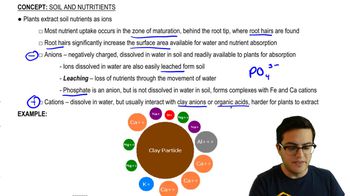Soil and Nutrients exam Flashcards
 Back
BackSoil and Nutrients exam
1/29
Terms in this set (29)
- SoilA dynamic mixture of minerals, organic matter, and living organisms essential for plant growth.
- MacronutrientsNutrients needed in large quantities by plants, such as nitrogen, phosphorus, and potassium.
- MicronutrientsNutrients needed in smaller quantities but still essential for plant life, such as iron and zinc.
- Cation ExchangeThe process by which plants exchange protons for nutrient cations like magnesium and calcium in the soil.
- What is loam?A type of soil with equal proportions of sand, silt, and clay, enriched with humus.
- Soil pHA measure of the acidity or alkalinity of soil, which influences nutrient absorption.
- HumusDecaying organic matter in soil that adds nutrients and improves soil structure.
- What is the role of root hairs?They increase the surface area for water and nutrient absorption in plants.
- Selective PermeabilityThe ability of the plasma membrane to control which substances can enter or leave the cell.
- What is soil erosion?The process by which wind and water carry soil away from a place.
- CationA positively charged ion.
- AnionA negatively charged ion.
- What is the function of proton pumps in plants?They create electrochemical gradients that allow ions to enter through transporters.
- TopsoilThe outermost layer of soil, rich in humus and microorganisms.
- What is the significance of soil texture?It affects water retention, nutrient availability, and root penetration.
- Nutrient AbsorptionThe process by which plants take up nutrients from the soil, primarily through root hairs.
- What are soil horizons?Layers of soil that vary in composition and color, extending from the surface to bedrock.
- Cation Exchange CapacityThe ability of soil to exchange cations, higher in humus than in clay.
- What is the role of worms in soil?They move soil around, cycle nutrients, and improve soil's ability to retain gases and water.
- Acidic SoilSoil with a low pH, often found in conifer forests due to decaying organic matter.
- Alkaline SoilSoil with a high pH, often resulting from the presence of limestone or calcium carbonate.
- What is leaching?The loss of nutrients from the soil through the movement of water.
- Ion ExclusionThe process by which plants filter harmful ions and prevent them from entering cells.
- What is the function of metallothioneins?Proteins that bind to metals and prevent them from poisoning the plant.
- Mobile NutrientsNutrients that can be transported around the plant, often moving to younger leaves.
- Immobile NutrientsNutrients that remain in the location where they were absorbed, often leading to deficiencies in older leaves.
- What is the zone of maturation?The area behind the root tip where most nutrient absorption occurs due to the presence of root hairs.
- Proton GradientA difference in proton concentration across a membrane, used by plants to facilitate ion transport.
- What is the role of the casparian strip?It forces ions to cross a membrane, acting as a filter to control what enters the plant's vascular system.



